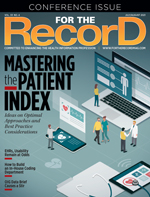July/August  2021
2021
Industry Perspectives: So You Got Your COVID-19 Vaccine: What’s Next?
By Katherine Lusk, MHSM, RHIA, FAHIMA
For The Record
Vol. 33 No. 4 P. 5
Whether it’s been at local pharmacies or at mass vaccination sites, it’s been encouraging to watch Americans enthusiastically sign up and do their part to get their COVID-19 vaccinations. And due to public debates about vaccine passports and discussions I’ve had with friends and colleagues, I know that many consumers are paying attention to what happens with vaccination data—people want to know whether their cities and communities are achieving herd immunity.
Routine vaccinations are part of every person’s wellness journey; they’re as important as routine mammograms, colonoscopies, and exercise. And because vaccination is such an integral part of our health and wellness, consumers need to understand that their experience with the pandemic doesn’t end when they get vaccinated. They also have a role to play in making sure their vaccination data gets to where they’re needed most: in the hands of their potential health care providers.
Being vaccinated against COVID-19 and other diseases such as measles helps providers treat patients more quickly. If someone presents at the emergency department with respiratory symptoms with their vaccination card in hand, the facility will know whether to test for coronavirus first or go down the path of testing for influenza, bronchitis, or some other disease process.
The Role of Vaccine Registries
Receiving my vaccine was a smooth process. I was notified through my patient portal that I could make an appointment, which I did through UT Southwestern. At the appointment, staff handed me my COVID-19 vaccination card, which I keep in my wallet so that I can share it with my primary care physician at my next appointment or anywhere that I might present for care.
My home state, Texas, like nearly every single state in the country, has an electronic vaccination registry that helps public health officials track immunizations, including COVID-19, measles, mumps, and rubella, as well as flu shots. In Texas, the registry is called ImmTrac2. It is a secure, confidential system that consolidates and stores immunization records from multiple sources in one centralized location. The state statute requires written consent by individuals before their data can be entered into the system. In other states, such as Illinois, individuals must fill out a form if they do not want their immunization data to be entered into the registry.
Registries are important components in the health care scheme. They help public health departments identify underimmunized populations, monitor community immunization rates, pinpoint coverage gaps, and improve vaccination rates.
The wrinkle with COVID-19 vaccination efforts is that the shots are being administered at a wide variety of locations, including chain pharmacies, stadiums, and even street fairs and festivals. We also know that people are crossing state lines to get vaccinated. Thankfully, registries are quite adept at tracking vaccinations that require a booster.
While most health care organizations should report vaccination data to the state registry, don’t assume they will. It’s imperative that individual immunization data are shared with physicians—by you—so that they can become part of your medical record.
Protect Your Privacy
Your vaccination cards are part of your own health care record. Therefore, you should protect them. That means you should be careful how you store and share the immunization card. If you take a vaccination selfie, make sure the fine print on the card—which is identifying information that’s highly sought after by identity thieves—is not visible in your photo.
We have endured a year of isolation, so let’s not put our privacy at risk during a time when we should be focusing on happy reunions with friends, family, and colleagues.
— Katherine Lusk, MHSM, RHIA, FAHIMA, is the president and chair of AHIMA.



